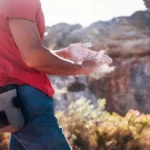If you’re a climbing enthusiast, you’ve probably wondered is chalk necessary for climbing. The answer is it depends. While having chalk on hand can be beneficial for climbers of all levels, there are specific scenarios where it might not be necessary. So let’s explore when and why you need chalk when climbing.
Is Chalk Necessary For Climbing?
Climbers use chalk to absorb sweat from their hands, so they don’t slip off holds while climbing. This makes it especially helpful in hot and humid weather or during intense climbs.
It also helps when gripping small holds or features that require grip strength, such as slopers, crimps, pinches, or laybacks. If your climb has any of these features, then using chalk will make a big difference in your performance.
On the other hand, if the route doesn’t have any of these features and you feel like your hands aren’t slipping off the holds, you may not need to use chalk.
Also Read: Is Climbing Chalk Bad For The Environment?
Alternative Uses of Chalk
In addition to absorbing sweat from hands, climbers also use chalk to mark holds on a climb that they find difficult or tricky sections so they can quickly identify them during future attempts on the same route.
This can be useful if you’re trying to improve your time on a particular route or just trying to remember what previously worked (or didn’t work) for you.
Climbers also use chalk to draw lines on the wall before attempting challenging boulder problems to help visualize their movements and plan out their routes ahead of time.
Also Read: How Does Climbing Chalk Work?
Different Types of Chalk
Powdered Chalk
The most popular type of chalk is powdered chalk. It’s made from a combination of magnesium carbonate and other minerals such as calcium carbonate or silica dioxide. It comes in various colors and has been used for decades by climbers worldwide.
Liquid Chalk
Liquid chalk is becoming increasingly popular among climbers due to its convenience and mess-free nature. It comes in small bottles that are easy to carry with you anywhere and don’t create dust when applied (unlike powdered chalk).
Climbing Salve
Climbing salves are another climbing aid that has become increasingly popular recently. These balms are usually made from beeswax or plant-based oils such as coconut oil or shea butter, and they provide a protective barrier between your skin and the wall.
Also Read: How Much Does Rock Climbing Chalk Cost?
The Benefits of Chalk

Chalk serves two primary purposes when it comes to climbing. The first is to help keep hands dry, which prevents slipping and helps climbers maintain their grip on the wall or rock face. The second purpose is to reduce friction between the hands and the rock face, allowing more effortless movement.
It also helps climbers focus better since they don’t have to worry about their grip slipping as much. Chalk also provides another benefit many people don’t consider – a psychological boost. For some climbers, having a little chalk in their hand gives them the confidence to make those problematic moves up the wall or rock face.
Knowing that your hands will not slip can be a huge mental boost when trying something new or challenging yourself on the wall. All the benefits are the answer to your question is whether chalk is necessary for climbing.
Also Read: How Long Does Climbing Chalk Last?
Chalk Alternatives
If you don’t like using chalk or want to try something different, some alternatives can also help keep your grip on the wall. First up is liquid rubber tape. This type of tape creates a thin coating on your hands and provides extra grip without using powdered chalk.
Another option is liquid rosin, which helps absorb sweat, adds extra grip, as well as helping protect against blisters. Some climbers also opt for fabric-based grips such as climbing gloves or finger tapes that wrap around each finger joint for extra protection against abrasion and slipping off holds.
Finally, some climbers rely on nothing but their natural grip strength to get them up walls without any additional aids such as chalk or gloves. However, this method requires significantly more skill than any of the above solutions!
Also Read: Does Climbing Chalk Contain Talc?
Conclusion:
Ultimately, is chalk necessary for climbing? So whether or not you need chalk when climbing comes down to personal preference and individual routes/problems.
Chalk can undoubtedly be beneficial for specific climbs with tricky features but may not be necessary for more accessible routes with larger holds that don’t require as much grip strength or technique. Whether or not you decide to use it, having some extra chalk handy never hurts!



